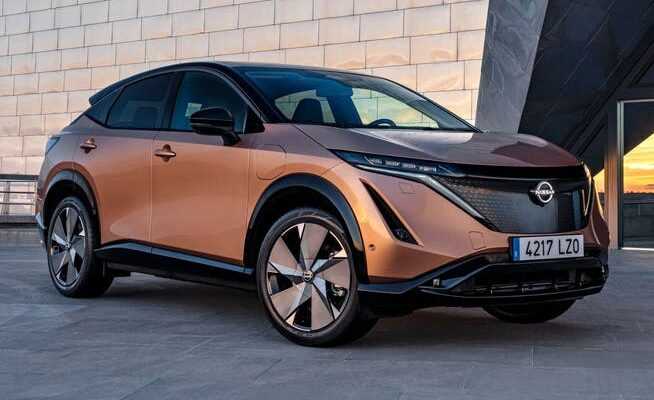A new study assesses car manufacturers’ progress in reducing their CO emissions2-Emissions. Well-known manufacturers from Japan fare worse than the competition. What are the reasons for the backlog?
With the new Ariya, Nissan wants to increase its share of electric cars in total production. However, more models will be needed.
In the course of the energy transition, a number of car companies have started to restructure their drive portfolios in order to meet the ever stricter target values for CO2– To be able to meet or even undercut emissions. The most prominent representatives are VW, Mercedes and Stellantis, which will achieve climate neutrality in their vehicle fleet by 2030 and a few years later also want to make production climate neutral.
The London information service IHS Markit has a study issued, which sheds light on what the forecasts of the car manufacturers and groups look like with regard to battery electric vehicles for the year 2029. The study makes it clear that the traditional Japanese car companies such as Honda, Toyota and Nissan are lagging behind the development of European companies.
Europeans ahead
The evaluation by IHS Markit shows that with the conversion of production to purely electric cars ordered by CEO Herbert Diess, a full 43 percent of Volkswagen’s total production should consist of battery-electric vehicles by the end of the decade. The rest is made up of vehicles with conventional combustion engines, which will still be needed in countries without a significant charging infrastructure in a few years. There are also areas where large market shares can still be achieved with plug-in hybrid cars and other hybrid drives.
Ford follows for 2029 with the forecast of 36 percent battery electric cars. On the one hand, there is cooperation with Volkswagen to build electric vehicles that will accelerate electrification. On the other hand, there is still a large market for vehicles with internal combustion engines or hybrid drives in North America. In the world’s second largest vehicle market, however, the launch of the F-150 pick-up – for decades the best-selling car in the USA – with a purely electric drive as the F-150 Lightning model could provide a major boost in the North American market towards electric vehicles.
The Korean Hyundai Group, which owns the Hyundai, Kia and Genesis brands, is predicting 27 percent pure battery electric cars by 2029. Given the group’s major efforts to conquer the world with electric cars such as the Hyundai Ioniq 5 (world car of the year 2022) and the Kia EV6 (Europe’s Car of the Year 2022), the forecast value appears relatively low. But consider that the Korean group is also working intensively on the spread of hydrogen propulsion, both for passenger cars and commercial vehicles. They are not counted in the study, nor are partially electrified vehicles, i.e. hybrid cars of any type.
Reluctant Japanese
The Japanese market leaders Toyota, Honda and Nissan are more cautious. The latter company forecasts a 22 percent share of total production by 2029. This is astonishing, since it was Nissan that launched the first mass-produced electric vehicle in 2010 with the Leaf; Renault Zoe followed shortly thereafter. But despite or perhaps even because of the great success of the vehicle worldwide, not much has happened in the field of battery electric vehicles at Nissan since then. There was a second Leaf model generation in 2017, but by the time it was launched it had already been well occupied by electric cars from other companies. Nissan has new hopes for the first all-electric car since the Leaf, the futuristic Ariya.
Honda is even more hesitant, having shown little interest in battery power since the introduction of the first hybrid cars until 2020. Honda has only had its first electric car for short city trips for a few years, and there are no other models in sight. It is therefore not surprising that the manufacturer expects a purely electrical share of the total production of 18 percent for 2029. The share could grow if Honda starts developing new electric car models together with the electronics group Sony as planned.
At the bottom of the table is Toyota, one of the world’s largest car companies, which predicts a battery electric car share of just 14 percent for 2029. This forecast confirms that Toyota, like Hyundai, continues to focus heavily on the development of hydrogen vehicles, including in the commercial vehicle sector. In addition, the group held on to the hybrid bestseller Prius for too long and also used the drive in other vehicles of the brand and the sister brand Lexus. When the electric car wave began, Toyota was completely without a battery electric car. The first fully electric Toyota bz4x and its technical brother Subaru Solterra will not appear until spring 2022.
Even if the Japanese companies are making conservative forecasts, according to their own statements, they have provided the necessary funds for the transition to battery cars. Honda has budgeted $39 billion to build greener cars over the next ten years. Subaru is planning $2 billion over the next five years. The investments are sorely needed on the way to emission-free driving. In Japan alone, the country of the first mass-produced battery-powered vehicle, the market share of battery-electric vehicles is just under one percent today. It’s time for Japanese manufacturers to think about how they can reduce their emissions not only in the domestic market, but also internationally. Sticking to the full hybrid is the wrong approach.
